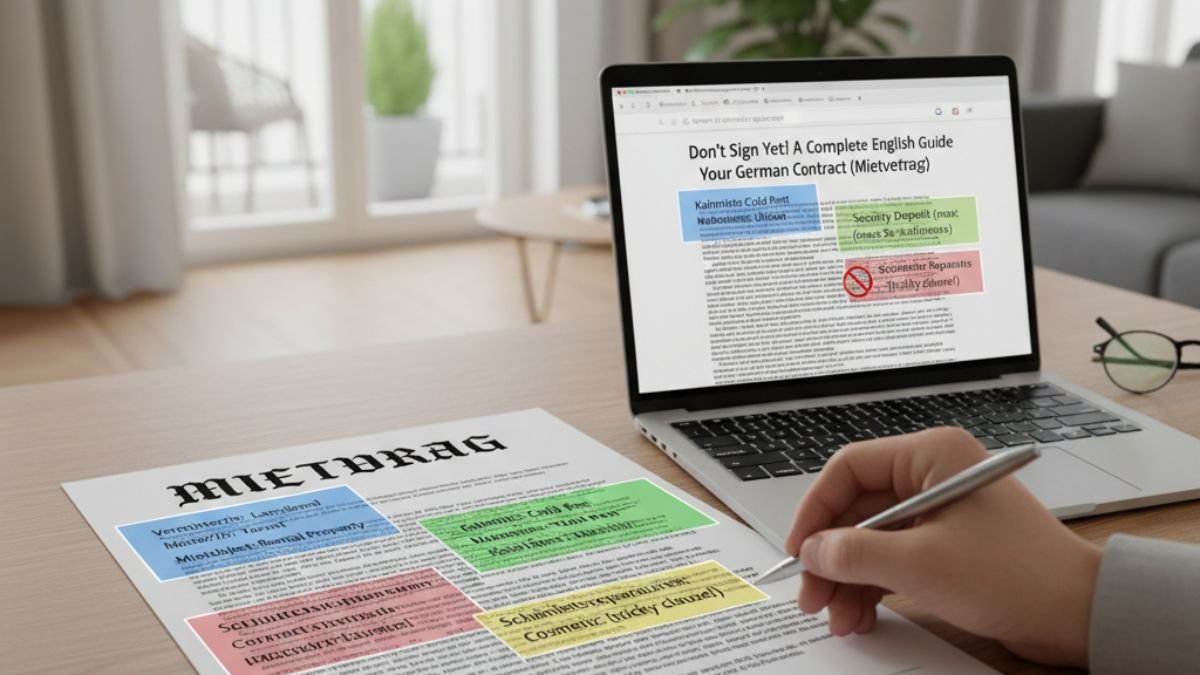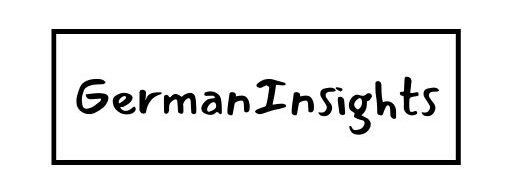Complete English Guide to Your German Rental Contract (Mietvertrag)

So, you’ve done it. You’ve navigated the competitive housing market in Germany and found a place to call home. Congratulations! The landlord has just sent over the rental contract, the mighty Mietvertrag. You open the document and… it’s a wall of dense, official-sounding German.
Panic might start to set in. What are you actually agreeing to? What’s the difference between Kaltmiete and Warmmiete? What on earth are Schönheitsreparaturen?
A German rental contract, or Mietvertrag, is a legally binding document that outlines the rights and responsibilities of both the landlord (Vermieter) and tenant (Mieter). German tenant laws are strong, and standard contracts are designed to be tenant-friendly. A clear, written contract is always recommended, even though verbal agreements can be legally valid for some types of tenancy.
This guide will walk you through the most important sections of a standard German rental contract. We’ll translate the key terms and, more importantly, explain what they mean for you as a tenant.
Important terms to know
| German Term |
|---|
| English Translation | Explanation | |
|---|---|---|
| Mietvertrag | Rental contract / Tenancy agreement | The overall legal document. |
| Vermieter | Landlord | The owner of the property. |
| Mieter | Tenant | The person renting the property. |
| Kaltmiete | Cold rent | The base rent without additional costs. |
| Warmmiete | Warm rent | The total rent, including Kaltmiete and Nebenkosten. |
| Nebenkosten | Operating costs / Utilities | Additional charges for water, garbage, janitor, etc.. |
| Kaution | Security deposit | The refundable deposit, up to three months’ Kaltmiete. |
| Übergabeprotokoll | Handover protocol | The document detailing the property’s condition at move-in and move-out. |
| Hausordnung | House rules | The rules for residents of the building. |
| Kündigungsfrist | Notice period | The time required to terminate the contract, usually three months for tenants. |
| Unbefristet | Indefinite | A lease with no set end date. |
| Befristet | Fixed-term | A lease with a specified start and end date. |
The Basics: Who, What, and Where
The first section is usually straightforward. It identifies the key parties and the property.
- Vermieter/in: This is your Landlord. It could be an individual or a property management company (Hausverwaltung).
- Mieter/in: This is you, the Tenant. Everyone who will be living in the apartment and is legally responsible for the rent should be listed here.
- Mietobjekt / Mietsache: This refers to the Rental Property. This section will detail the full address, including the floor (Etage or Geschoss), and the apartment number. It should also specify what’s included in the rental, such as:
- Keller: A basement storage unit.
- Stellplatz / Garage: A parking space or garage.
- Einbauküche (EBK): A fitted kitchen.
The Money Section: Understanding Your Rent
This is arguably the most critical part of the contract. German rent is broken down into several components.
Kaltmiete (Cold Rent)
This is the base rent for the property itself, excluding any additional costs. It’s the price for the physical space.
Nebenkosten / Betriebskosten (Additional Costs / Operating Costs)
Often called the “second rent,” these are the costs the landlord pays for the building’s upkeep and passes on to the tenants. You typically pay a monthly advance on these costs. Common Nebenkosten include:
- Heating (Heizung) and Hot Water (Warmwasser)
- Water supply and sewage
- Trash removal (Müllabfuhr)
- Building cleaning (Gebäudereinigung)
- Gardening (Gartenpflege)
- Property tax (Grundsteuer)
- Building insurance (Versicherungen)
Important: Electricity (Strom) for your apartment and internet/phone are usually not included in the Nebenkosten. You will have to sign separate contracts with providers for those services.
Warmmiete (Warm Rent)
This is the total amount you will transfer to your landlord each month. The formula is simple:
The Annual Bill: Die Nebenkostenabrechnung
Once a year, your landlord will calculate the actual Nebenkosten for the building. They will compare this to the advance payments (Vorauszahlungen) you’ve made.
- If you paid too much, you’ll get a refund (Guthaben).
- If you paid too little, you’ll have to pay the difference (Nachzahlung).Ask to see the previous year’s bill to get a realistic idea of the actual costs.
Kaution (Security Deposit)
This is a one-time payment to secure the rental.
- Legal Limit: The Kaution cannot be more than 3 times your monthly Kaltmiete (cold rent).
- Payment: You have the right to pay it in three monthly installments.
- Holding: The landlord must keep your deposit in a separate, interest-bearing savings account (Mietkautionskonto), away from their personal assets.
- Return: The landlord can use the deposit to cover damages beyond normal wear and tear after you move out. They must return the remaining amount (plus interest) within a reasonable timeframe, which can range from a few weeks to six months.
Duration and Termination: How Long and How to Leave
- Unbefristeter Mietvertrag (Unlimited Contract): This is the standard type of contract with no set end date. To terminate it, you must give written notice. The legal notice period (Kündigungsfrist) for tenants is almost always three months to the end of a calendar month.
- Befristeter Mietvertrag (Fixed-Term Contract): This contract has a specific end date. Landlords must have a valid legal reason to offer a fixed-term contract (e.g., they plan to move into the apartment themselves). Usually, neither party can terminate the contract before the end date. Be cautious with these.
- Kündigung (Termination): Your notice to terminate the contract must be in writing (a signed letter, not an email) and delivered to the landlord.
Condition of the Apartment & Responsibilities
Übergabeprotokoll (Handover Protocol)
This is one of the most important documents you will sign besides the contract itself. It is a detailed report on the condition of the apartment when you move in.
- Be meticulous: Walk through every room with the landlord before you move your things in.
- Document everything: Note every scratch, stain, or non-functioning item.
- Take photos: Photographic evidence is your best friend.
- Both parties sign: Once signed, this document protects you from being blamed for pre-existing damage when you move out.
Schönheitsreparaturen (Cosmetic Repairs)
This is a famously tricky clause. It refers to minor decorative repairs like painting walls, filling drill holes, and painting door frames from the inside. Many older contracts contain rigid clauses (e.g., “you must paint every 3 years”) that are legally void today.
- Modern Rule: Generally, you only need to perform these repairs if the apartment was freshly renovated when you moved in and you have lived there for several years. You must return the apartment in a condition that reflects normal wear and tear. If you painted the walls bright orange, you’ll need to paint them back to a neutral color.
Hausordnung (House Rules)
The Mietvertrag will almost always reference a set of house rules. This is a legally binding document that governs living together in the building. It typically includes rules on:
- Ruhezeiten (Quiet Hours): Usually from 10 PM to 7 AM, and all day on Sundays. No loud music, vacuuming, or drilling during these times.
- Mülltrennung (Waste Separation): Rules for recycling and trash disposal.
- Kehrwoche / Flurreinigung: Rules for cleaning common areas like stairwells.
- Lüften (Airing out): Rules about properly ventilating to prevent mold.
Final Checklist Before You Sign
Before putting pen to paper, run through this final checklist:
- [ ] Understand the Rent: Do you know the exact amounts for Kaltmiete, Nebenkosten, and the total Warmmiete?
- [ ] Check the Deposit: Is the Kaution three months’ Kaltmiete or less?
- [ ] Contract Type: Is it unlimited (unbefristet) or fixed-term (befristet)?
- [ ] House Rules: Have you received and read the Hausordnung?
- [ ] Pets (Haustiere): If you have a pet, does the contract explicitly permit it or require landlord approval?
- [ ] Ask Questions: Don’t be afraid to ask the landlord or Hausverwaltung to clarify any points you don’t understand.
- [ ] Get a Second Opinion: If possible, have a German-speaking friend review the contract. For serious concerns, consider contacting a local Mieterverein (Tenants’ Association) for legal advice.
Moving to a new country is an adventure. By understanding your Mietvertrag, you’re taking a huge step toward settling in comfortably and securely.
If you’re looking for more blog like What is a SCHUFA Report? A Simple Guide on How to Get Yours Fast and The Documents You Need to Rent an Apartment in Germany subscribe to join us.






